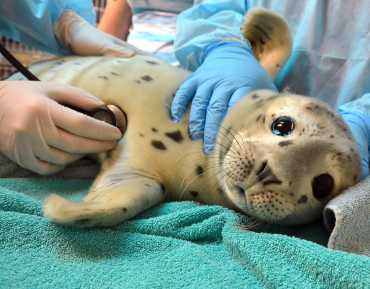
The Marine Mammal Center Investigates Dead Gray Whale That Washed Ashore at San Francisco’s Crissy Field
- Pathology
A team of scientists from The Marine Mammal Center, the world’s largest marine mammal hospital, were unable to confirm a cause of death on a gray whale that washed ashore Wednesday morning at San Francisco’s Crissy Field.
The Center’s experts and partners at California Academy of Sciences performed a necropsy, or animal autopsy, at Angel Island State Park Thursday morning after the animal was towed there early Wednesday. By investigating deaths like this, the Center is able to identify and respond to both rapidly changing environmental trends and human impacts on marine mammal populations.
“We’re concerned to discover this year’s first gray whale death here in the San Francisco Bay Area because this species already faces many environmental challenges,” says Barbie Halaska, Necropsy Manager at The Marine Mammal Center.
While this whale’s death is a sad loss for the population, the information gathered from these whales is shared directly with our partners, helping inform policy decisions that can protect habitat areas, change shipping lane speeds that intersect migration routes and better understand shifting food sources for marine mammals.
During the necropsy, experts identified the gray whale as a 41-foot adult female that was moderately decomposed based on the quality of the internal organs. The team found that the animal was not lactating, which means the female whale was not traveling north with a calf from this season.
The Center’s pathologists noted the whale was in good body condition based on the animal’s blubber layer and internal fat levels. The whale also had a full stomach of food material from a recent feeding, and no signs of an underlying illness were discovered.
Based on this evidence, the Center’s pathologists suspect the animal died suddenly, although no blunt-force trauma -- such as bruising or fractured bones -- that would indicate a ship strike was initially found. The team plans to revisit the carcass to reexamine the skeletal remains in order to completely rule out human interaction.
Biologists have observed gray whales in poor body condition during their annual migration since 2019. Increased numbers of gray whales have since been sighted in the San Francisco Bay as the population continues their northerly migration to cool, food-rich Arctic waters.
Climate change affects water temperatures and prey availability, leading to shifting food sources for marine mammal populations and other marine species. Overfishing can also lead to reduced prey availability. Effective policies are critical to protect vulnerable marine mammal populations from the many human-caused threats they face in the wild.
“As gray whale migration season continues along the Pacific coast, adult female gray whales and their calves are the last to migrate northward to their feeding grounds in the Arctic,” says Dr. Pádraig Duignan, Director of Pathology at the Center.
Following the huge increase in gray whale deaths, it was encouraging to see this particular whale in good body condition after examining so many that suffered from malnutrition.
As part of the National Oceanic and Atmospheric Administration’s Unusual Mortality Event Working Group for the species, The Marine Mammal Center is committed to partnering with organizations and individuals to find long-term environmental solutions to prevent these deaths in the future. In recent years, malnutrition, entanglements and blunt-force trauma from ship strikes are the most common causes of death in whales the Center’s research team has investigated.
The Center’s experts were first notified of a dead whale in the Bay by the San Francisco Police Department early Wednesday morning. After coordinating with the U.S. Army Corps of Engineers and a private towing company, the whale was safely moved to Angel Island State Park. The Center collected tissue samples and baleen during the necropsy to contribute to baseline data and various research studies. The California Academy of Sciences archived the whale’s pelvic bones and baleen in their scientific collection.
As an essential business operating during the ongoing pandemic, the Center and its partners are currently deploying response teams with fewer personnel for shorter durations and with increased personal protective equipment to safely continue this important work. This necessary action has led to a decrease in data and sample collection during necropsies, which can make it more difficult to determine why a whale may have washed ashore.
The Marine Mammal Center would like to remind the public that they play an important role in the conservation of gray whales and other whale species by reporting whale sightings to MarineMammalCenter.org.
To report a dead whale or whale in distress, the public can call the Center’s rescue hotline at 415-289-SEAL (7325).
For more information or to set up an interview on this topic, please contact us at media@tmmc.org.
Yes, I want to save a life!

Yes, I want to save a life!
You’ll be giving sick and injured animals the best possible care at the Center’s state-of-the-art hospital. With your gift today, you are giving a patient a second chance at life in the wild.
See Our Latest News
{"image":"\/Animals\/Wild\/Gray whale\/cropped-images\/two-gray-whales-golden-gate-bridge-shutterstock-0-0-1270-992-1770234810.jpg","alt":"two gray whales under the Golden Gate Bridge","title":"The Marine Mammal Center and San Francisco Harbor Safety Committee Pilot New Vessel Operator Training Program","link_url":"https:\/\/www.marinemammalcenter.org\/news\/the-marine-mammal-center-and-san-francisco-harbor-safety-committee-pilot-new-vessel-operator-training-program","label":"Press Release","date":"2026-02-06 01:00:00"}

The Marine Mammal Center and San Francisco Harbor Safety Committee Pilot New Vessel Operator Training Program
February 6, 2026
Read More{"image":"\/Animals\/Wild\/Bottlenose dolphin\/cropped-images\/dolphinphoto-by-adam-li-c-noaa-0-0-1270-992-1769539954.jpg","alt":"A bottlenose dolphin jumps out of the water.","title":"What\u2019s the Difference Between Dolphins and Porpoises? And Other Animal Trivia","link_url":"https:\/\/www.marinemammalcenter.org\/news\/whats-the-difference-between-dolphins-and-porpoises-and-other-animal-trivia","label":"News Update","date":"2026-01-26 23:00:00"}

What’s the Difference Between Dolphins and Porpoises? And Other Animal Trivia
January 26, 2026
Read More{"image":"\/Animals\/Patients\/Sea otters\/2025\/cropped-images\/so-mooring-release-2-laurie-miller-c-the-marine-mammal-center-USFWS-permit-MA101713-1-147-8-1270-992-1770307740.jpg","alt":"Sea otter - Mooring","title":"Rescue Stories: Southern Sea Otter Mooring Named the 2025 Patient of the Year","link_url":"https:\/\/www.marinemammalcenter.org\/news\/rescue-stories-vote-for-your-favorite-marine-mammal-patient-of-2025","label":"News Update","date":"2026-01-16 10:05:08"}

Rescue Stories: Southern Sea Otter Mooring Named the 2025 Patient of the Year
January 16, 2026
Read More{"image":"\/People\/Action\/Veterinary care\/cropped-images\/Harris_Green turtle_TMMC-0-0-1270-992-1767649941.jpg","alt":"Heather Harris","title":"Seattle Aquarium Awards Dr. Heather Harris With Prestigious Conservation Research Award","link_url":"https:\/\/www.marinemammalcenter.org\/news\/seattle-aquarium-awards-dr-heather-harris-with-prestigious-conservation-research-award","label":"In the News","date":"2026-01-05 04:48:00"}

Seattle Aquarium Awards Dr. Heather Harris With Prestigious Conservation Research Award
January 5, 2026
Read More